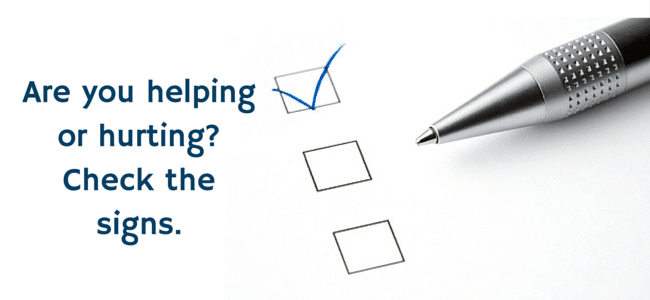
In the case of an addicted loved one, many things people do to help are actually hurting the addict. An addict who has loved ones that are always willing to correct their mistakes or continually help them out when they mess up is not going to experience the consequences of their addiction.
There are certain areas in which family members often feel an obligation to step in and fix problems caused by substance use. If you are wondering how to deal with the addict in your life, below are five things you might be doing to help that could actually be hurting your loved one.
Making excuses or lying for them.
It’s so easy to do, and loved ones commonly make excuses for each other, but making excuses for an addict means they do not have to face the consequences of their substance use. Don’t call in to work for them, don’t make excuses as to why they can’t make it to something they’ve committed to, and certainly don’t lie about their addiction. Instead, make your loved one be honest about why they were absent or late, and be open about the problem yourself so that the person can get the help they need. Don’t be ashamed of an addiction or try to hide it, but rather encourage your loved one to face it, the consequences, and get help.
Paying bills for them.
Having a drug addiction or alcoholism can be costly. If you as the loved one take over the addict’s important bills because they never seem to have enough money, you are in essence handing them money to buy more drugs. Don’t pay for their personal elements like cell phone, phone plan, car insurance, car, gas, eating out, or clothes. No one wants to see their loved one struggle financially or be without a place to live, but enabling them by paying their bills will not encourage them to change an addiction lifestyle.
If you are fearful they might steal, forge checks, use your credit card without permission, or engage other illegal activities to finance their habit, report that activity to the police. See the next item.
Not pressing charges or calling the police.
Another area in which families struggle is when the addict breaks the law because of their substance abuse. When the person drinks while under the influence, takes money or credit cards, forges checks, takes a car without permission, has drugs on them or in the house, or uses while underage, they need to experience the punishment for these actions. Most parents don’t want to see their child get in trouble for something that would go on their permanent record at a young age, and other loved ones don’t want to be responsible for someone getting punished by the law. But taking away the negative consequences for substance use will only encourage the person to keep doing what they are doing rather than get help.
Not charging them rent.
An adult child who is in college or grad school should be working toward self-sufficiency, and allowing them to live rent-free during these years is asking for trouble. Make your young adult accountable for their spending, teach them how to budget their money, and don’t make it easy for them to spend their money on drugs or alcohol. Paying rent and becoming self-supportive will open their eyes to the realities of life and grow their self-esteem, independence, and self-sufficiency skills.
Not pushing them to get a job.
Finally, if you are a parent, it is important for you to teach your child how to be responsible with money, and part of that is having money come in by getting a job. Staying active with a job or extracurricular activities is one of the best ways to keep a teen from using drugs or alcohol in the first place. When a teen is bored and doesn’t have a purpose in life is when they often start experimenting with substances. If your teen isn’t involved in volunteer work, sports, or other extracurriculars, push them to get a job to help fill their time, give them purpose, and discover some of their real talents and interests.
When you enable your loved one’s addiction, they get the idea the addiction isn’t really harmful or dangerous, and assume the high and self-medicating aspects of the addiction outweigh the harm and destructive aspects. Hard as it is, you need to allow the ugly side of addiction to rear its head, so your loved one sees reality as clearly as possible. They will need some kind of “rock bottom” to open their eyes, and your well-intended but enabling actions are just delaying rock bottom and allowing the addiction to get stronger.
The goal with these suggestions isn’t to hit an addict while they’re down. We don’t desire to see a loved one struggle or endure hardships because of bad choices they’ve made, but these suggestions encourage them to get help. Addiction does not go away on its own, and it takes determination and strategic support to finally overcome an addiction.
If you have a loved one that is addicted to drugs or alcohol, contact Lighthouse Network to learn about our services. We can connect you with a treatment program that is right for your family, and we will walk you through the entire recovery process. Contact us at 844-LifeChange (543-3242) today for help.
